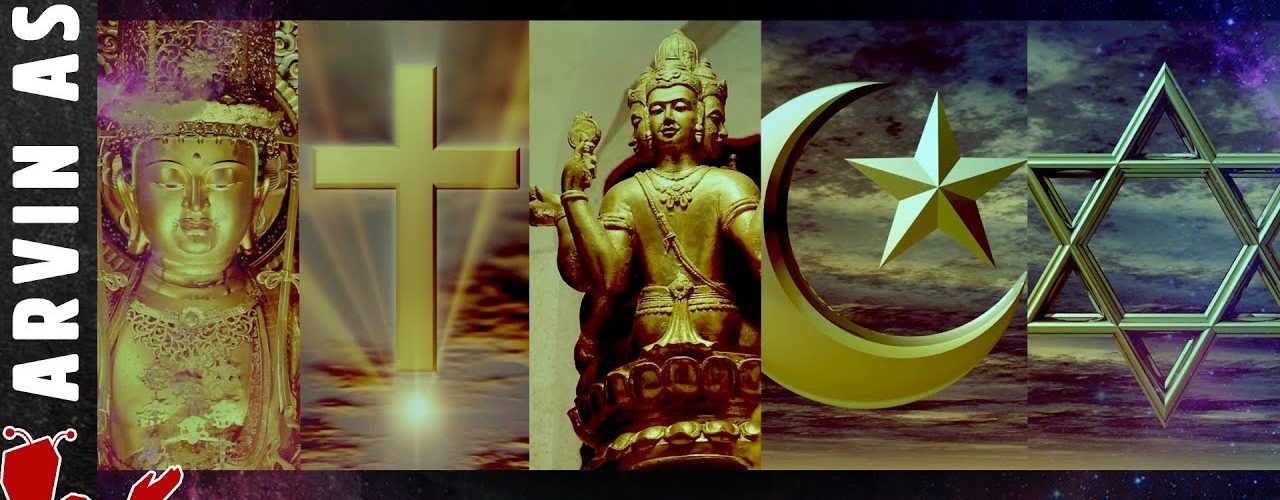5 of the worlds most widespread and influential religions are Christianity, Islam, Hinduism, Buddhism and Judaism. You may be surprised to learn that they all share something in common.
In order to understand what they have in common, you have to know a little about them. So let’s start with that.
Buddhism
The chief problem in life is suffering and it is caused by desiring worldly things. Suffering can be eliminated by getting rid of material desires. This will help you realize Nirvana, a state of bliss characterized by freedom from rebirths.
Buddhists do not worship any God. Buddha was not a god, but a person who realized spiritual enlightenment and freedom from the cycle of birth and death. Most Buddhists believe a person has countless rebirths, which leads to suffering. To end these rebirths, the goal of a Buddhist is to purify one’s heart and to let go of all yearnings of sensual desires and material attachment.
Through practiced meditation a person may reach Nirvana – the ridding of desires, and freedom from reincarnations.
Christianity:
God is a loving God who offers everyone a personal relationship with himself now in this life. All people are born in sin.
God sent his Son to earth to save humanity from the consequences of its sins. Faith in Jesus Christ can deliver you from your sins. Jesus was tortured and gave his life on the Cross (At the Crucifixion). Jesus rose from the dead on the third day after his Crucifixion (the Resurrection) and proved his deity. The holy book of Christianity is the Bible, consisting of the jewish old testament and new testament.
Followers of Jesus regard the Bible as God’s written message to humankind. In addition to being an historical record of Jesus’ life and miracles.
Hinduisim:
The world is an illusion, and the goal of humanity is to free the soul from constant rebirth and reincarnations, and to be absorbed into the cosmic consciousness, called Brahman. Central to Hindu belief is the concept of Karma – where past deeds are responsible for present circumstances. If a person’s behavior in the past or in a past life was evil, they might justifiably experience hardships in this life. Hindus believe that godly consciousness is present in everyone and everything. So if God is present in everything, then to a Hindu, worshipping an idol in the form of deities, gurus, rivers, or animals is equivalent.
In its truest sense, Hinduism is monotheistic, but is regarded by many as polytheistic because of the various representations of the one Brahman that Hindus might worship. Most Hindus agree that the root of their philosophy comes from a set of books called the Vedas, which translates to “Books of Knowledge,”
Islam:
Life is to be lived in subordination to God’s will. Devotional life centers on the confession, “There is no God but Allah, and Muhammad is the messenger of Allah” Allah is the sole and sovereign ruler of the universe, and source of all good and evil. Everything that happens is Allah’s will. To be a Muslim, one must follow five religious duties: 1. Repeat a creed about Allah and Muhammad 2. Recite certain prayers in Arabic five times a day 3. Give to the needy 4. One month each year, fast from food, drink, sex and smoking from sunrise to sunset; 5. Pilgrimage once in your lifetime to worship at the shire in Mecca.
At death — based on one’s faithfulness to these duties — a Muslim hopes to enter Paradise. If not, they will be eternally punished in hell.The scripture of Islam is called the Qur’an, God’s word dictated to Muhammad over a period of 22 years.
Judaism
There is a single God who not only created the universe, but who continues to rule it. Jews are the chosen people of God with whom he has a covenant to set an example of holiness and ethical behavior in the world. Judaism establishes a relationship between Israelites, the Children of Israel and God. Judaism says that death is not the end of the world and that a new world is yet to come into existence.
The Ten Commandments are the basis for serving God and for relating to others. Jews also follow the Talmud, a collection of rabbinical interpretations of the Torah. Sabbath observance is the foundation for Jewish worship. The 24 hours from sunset Friday to sunset Saturday are designated as a time of worship and rest from work. The Torah or old testament, the five books of the Hebrew Bible form the most important constituent of the scriptures of Judaism.
What do these religions have in common. They all require faith that its teachings and practices will result in everlasting happiness for the human soul. In that sense, all these 5 religions serve a common purpose. So you have to ask the question, if every pilgrim is after the same result for the human soul, why do we keep fighting on our way to get there?







